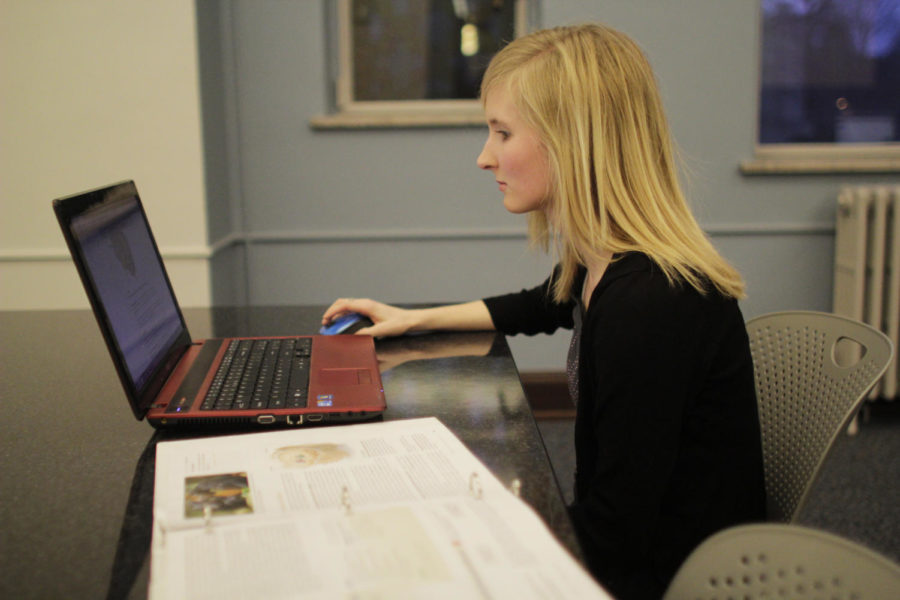Different course options have benefits and disadvantages
Kelby Wingert/Iowa State Daily
Natalie Gillenwater, sophomore in music education, is currently taking Psychology 230 online through Iowa State. She uses a textbook and often has to watch lecture videos online before she takes quizzes over the material she learns.
March 12, 2014
As the first day of registration for classes this upcoming summer and fall quickly approaches, students may find themselves thinking about taking courses online. Many courses at Iowa State offer an online alternative to its on-campus classes and there benefits and costs associated with each option.
Natalie Gillenwater, a sophomore in instrumental music education, is currently taking Psychology 230 online because there is no room in her schedule for her to attend either of the two scheduled times when the course is held on-campus. Gillenwater has to pass this course, a prerequisite for classes she has to take later, before next year to stay on course to graduate and she has on-campus-only music classes at the same times that this course meets on-campus.
“It hasn’t been bad,” Gillenwater said. “It’s probably saved me a lot of time actually because I don’t have to [physically] go to class, I can do it [the coursework] whenever I want to, and it doesn’t take up a lot of time.”
Sara Wodka, junior in vocal music, is taking Food Science & Human Nutrition 167 because she wanted more free time in her schedule.
“I have enjoyed this online class and I do have more time because of it,” Wodka said. “I don’t have to go to lectures three times a week.”
Gillenwater and Wodka say that their lectures are prerecorded and posted on Blackboard along with anything else that may supplement the lecture. There are also homework assignments and quizzes that have to be completed through Blackboard in these online classes. Tests for online classes can either be taken at a testing center or on any computer, depending on the course.
While taking classes online is a convenient alternative for students with conflicts in their schedules, students have to stay on top of their coursework mostly without the personal interactions with their peers and instructors when taking online classes.
“It’s very difficult to keep on top of things and to be disciplined in studying for that class,” Wodka said. “You aren’t meeting with that professor [frequently] and you’re not physically there.”
“It takes being a lot more motivated to sit down and learn the material on your own,” Gillenwater said. “You have to read the books without being given a lecture right in front of your face.”
If students take an online class at Iowa State, they have to pay an extra “delivery fee” to take the class. This “delivery fee” supports the additional people and infrastructure for some distance education programs and can range from nothing to hundreds of dollars, depending on the course. Gillenwater paid $150 for her course’s “delivery fee,” while Wodka only paid $100.
Richard Mansbach, professor of political science, is teaching two four-week sections of Political Science 315 this summer and offering his course online because of the convenience of letting students watch the films on their own time.
“Although they [the students] have to get work done within each week, they can decide how they want to do it [the coursework] and when they want to do it,” Mansbach said. “It is immensely helpful for students who are working and for students who are not physically here [at Iowa State].”
Even though this will be Mansbach’s first class he will teach over the Internet, he already knows how teaching through this new medium will be different from teaching live in a classroom.
“When you have students in a class, there’s more interaction, it’s more spontaneous,” Mansbach said.
With all of the film clips, still photographs and maps that the students in this class will have to look at, Mansbach feels that the students will not get to see him on their computer screens much, even though his lectures will be posted for his students to watch.
As a result of the lack of personal interaction Mansbach will have with the students in his summer class, students will have to respond to message boards topics regularly. Mansbach will also allow students to contact him through e-mail or phone if they need help.
The students will not have to buy any textbooks because all of the materials they will need will be online on JSTOR and Blackboard. Additionally, an electronically-submitted essay will be the final exam at the end of each four-week section of the course.
“Blackboard is very helpful for online courses, there’s no question about it,” Mansbach said.
Registration for this upcoming summer and fall semesters begins on March 24 with projected seniors able to register beginning March 25 on AccessPlus.







